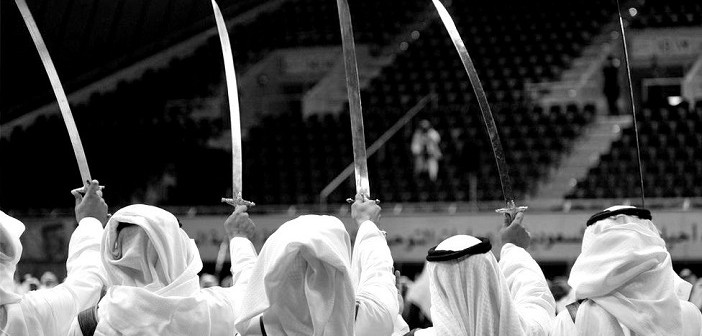The Islamic terrorism is a Saudi trade mark. But the world can no longer tolerate the religious extremism and terrorism that Wahhabism has largely been blamed for. Other facts are that Saudi Arabia is unqualified to be a genuine opponent to Iran and that the kingdom has no valuable assets to boast about other than its proved oil crude reserves. Will finally the new king make some changes?
One year of King Salman bin Abdulaziz’ ruling has made a difference in Saudi Arabia’s mind-numbing and disturbing politics, especially thanks to his ambitious son Mohammed who has been the driving force behind the recent changes. It is still too early to anticipate genuine transformations in the kingdom under the incumbent monarch. Yet the authority has been delegated to Mohammed bin Salman, presaging more changes ahead. The young prince is obviously being groomed to assume the throne. He is very likely to be designated to lead a controlled transformation that is urgently needed to maintain the oil-rich country stable, as well as the entire region.
Though political transformation process and religious reform in Saudi Arabia have been demanded at national, regional and international levels, deep and drastic changes are unlikely to happen in the foreseeable future. However, the country ought to embark on a reformative political and religious campaign before it is too late. Saudi people have been looking forward to reforms since a long time. The late king, Abdullah, was expected to bring some changes, particularly as popular uprisings were sweeping the Arab world during the ‘Arab Spring’. Ironically, he didn’t, but instead he sought to bring about political changes in Libya and Syria.
Unexpectedly, King Salman seems to have a plan or desire to make some changes. Appointing a crown prince of the third generation of the royal dynasty is the first step toward change in the leadership and, perhaps, in policy. Mohammed bin Salman has already initiated some economic reforms. Such reforms may be important but they are unlikely to pay off unless they coincide with political and administrative reforms. Above all, Saudi Arabia’s number one problem is not of economic nature, it is political and spiritual.
Saudi Arabia’s Religious Policy
A religious policy review is necessary. The world can no longer tolerate the religious extremism and terrorism that Wahhabism has largely been blamed for. Since 1979, the Saudi government has kept on accusing Iran of seeking to export the Iranian Islamic Revolution to other Muslim countries. Yet Saudi Arabia’s regime has already exported its Wahhabi doctrine to every corner around the world. With its well-established religious institution and huge petro-dollar treasury, Saudi Arabia has effectively contributed to the Islamic extremism and terrorism, which Muslim nations are being plagued by at the moment. Yemen is a typical example for the Saudi religious influence. Yemeni society has mostly been radicalized by the Saudi political and religious establishment. Yemenis also were the first victim of the Islamic terrorism which is a Saudi trade mark. The ongoing devastating conflict is mainly a product of the Saudi counterproductive policy. By provocatively promoting Wahhabism in the heartland of Zaidism, Sa’ada, it has forced the Houthis to revive the Zaidi doctrine, then to align themselves with Iran.
Wahhabism has caused serious troubles for Muslims in Saudi Arabia and elsewhere. The 47 dissidents who were executed on the second day of this year were victims of the Wahhabi conservative conceptions which legalize the beheading of anyone daring to challenge the ruler or protest against the justice of the government’s policies. This is the main reason behind the Saudi regime’s unlimited support to Wahhabism. But killing dozens or hundreds of opponents can merely delay a rebellion but not forever.
Recently there has been an increasing awareness about Saudi Arabia’s role in promoting Islamic radicalism and terrorism. Western media pundits and activists urged their leaders to rethink their ties with the Saudi regime. Medea Benjamin wrote: “The Yemeni crisis should serve as a prime moment for the U.S. to reconsider its alliance with the Saudi regime, a regime that not only denies human rights to its own people, but also exports death and destruction abroad.” Worth noting that Al-Qaeda’s founder was a Saudi national and 13 out of 16 suspected terrorist –hijackers who carried out the 9/11 terrorist attacks were Saudis. The ISIS Jihadi doctrine and practices such as demolishing the historical sites and monuments in Iraq and Syria are in line with the essence of Wahhabism.
The Saudi coalition, involving 34 countries against terrorism, will never work as long as Wahhabism continues to be promoted inside the kingdom and worldwide. If the Saudis really want to contribute toward controlling terrorism, they need to start by reforming the Saudi religious establishment and policy.
Saudi-Iranian Rivalry
Describing the dispute between Saudi Arabia and Iran as a regional rivalry may be inaccurate. Iran’s truly regional competitors at present are Turkey and Israel. Historically, the Arab nation as a whole, or led by Egypt, proved a strong challenger. Iraq backed by some Arab states is a potential contender. Saudi Arabia, however, is unqualified to be a genuine opponent to Iran.
Saudi Arabia’s endeavour to establish a Sunni coalition or to mobilise Sunni Muslims to counter the increasing Iranian influence is a big mistake or at least a miscalculated move. This policy has proved counterproductive in Iraq and Syria. It has only pitted Arabs against each other, also seriously neutralising the two main Arab frontlines against Arab competitors Iran and Turkey.
In the case that a Sunni-alliance is established to deal with the Iranian regional hegemony, it may only serve the Turkish interests, who are seeking to revive the Turkish dream of re-establishing the Ottoman empire. Turkey today is more qualified to lead the Sunni Muslim camp than Saudi Arabia. The progress made by the Turkish Islamic Party, Justice and Development, has appealed to a large number of Arab peoples. The name “Justice and Development” has already been replicated in some of the Arab countries, including in Yemen.
For Iran, the Islamic Revolution’s slogans and actions have been admired by the Shiite Muslims across the Arab world. The leaders of the Islamic revolution have established an effective political system and brought about a series of economic and religious reforms. Spiritually, Iranian politicians have successfully kept committed to religious traditions and remained open-minded for philosophical and scientific theories. The Iranians have much to offer at practical and theoretical levels.
Meanwhile, Saudi Arabia has nothing to offer except for the Wahhabi rigid style of Islam, which is the most divisive and confrontational of all Islamic schools and doctrines. There is no political, economic, social or managerial policy developed in Saudi Arabia to attract Muslims. The Saudi monarchy has been relying on its close alliance with the US and its huge oil reserves to survive.
Saudi Oil
The fact is that Saudi Arabia has no valuable assets to boast about other than its proved oil crude reserves estimated at 250 billion barrels. Perhaps the oil could be said to be a resource that has turned from a grace into a curse upon the Arab nation: the ultra-conservative Wahhabi doctrine can never spread unless petro-dollars help it to. Also the image that Arabs and Muslims have would not have been distorted as it is today: the western super-powers will never align themselves with one of the worst theocracies in the living history around the world. For the Saudi’s oil, the US and European allies were willing to turn a blind eye on the Saudis’ direct and indirect links to radical Islamist extremism and terrorism. But could it be imaginable that the Republic of France would align itself with Saudi Arabia against a secular regime in the Arab world?
I should not be mistaken: Saudi leadership is not as bad that it would willingly act against Arab and Muslim nations. None of the Saudi leaders was and will ever be allowed to stand for Arab national interest if it is against the US, Israel or the Western nations. For instance, in 1973, during the Arab-Israeli war, the late Saudi monarch Faisal bin Abdulazis had barely made a hint about the Arabs perhaps disrupting oil supplies to the West – and he was assassinated not long after. In his book, The Revenge of Geography, Robert D. Kaplan argued that it is not in the interest of the West for Saudi Arabia to be a democratic nation.
Saudi Arabia has never been a true challenger to Turkey or Iran. So, if Saudis would like to cope with the resurrection of the Ottoman Empire and the growing Iranian domination, they have to align themselves with Egypt. Neither antagonizing Iranians nor joining the Turks will be helpful for the Arab nation. A broad Arab coalition bringing all Arabs together -Sunnis and Shiites- is the onlyway to ensure Saudi Arabia a better future and a significant position among the world’s nations.
Challenging Iran and aggressive action in Yemen might have gained prince Mohammed bin Salman wide popularity in the kingdom.
Yet he is really going to be a national hero and great leader if he can establish political reforms that ensure Saudi people equal citizenship and a greater role in the process of decision making.



